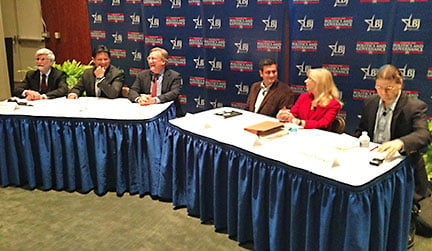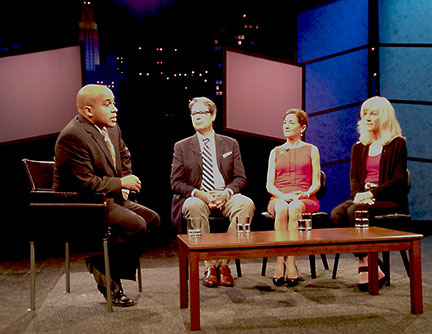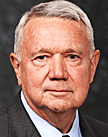Top Stories
Court halts $354 million development subsidy
Austin City Manager: Dallas discard vs Austin retread
Latest articles
What Can Austin Learn From California?
What Can Austin Learn From California?
Panel discussion focuses on how Golden State
experiences inform city’s move to 10-1 council
by Ken Martin
© The Austin Bulldog 2013
Posted Monday, May 6, 2013 2:00am
Updated with video link Tuesday May 7, 2013 10:50am
 California’s official nickname, The Golden State, adopted in 1968, harkens back to the discovery of gold in 1848. Now the left-coast state’s experiences with using an independent citizens commission to draw maps for 177 seats in four different governing bodies offers a golden opportunity for learning how best to implement the City of Austin’s 10-1 plan.
California’s official nickname, The Golden State, adopted in 1968, harkens back to the discovery of gold in 1848. Now the left-coast state’s experiences with using an independent citizens commission to draw maps for 177 seats in four different governing bodies offers a golden opportunity for learning how best to implement the City of Austin’s 10-1 plan.
The 10-1 plan for electing council members from geographic districts was approved by 60 percent of Austin voters last November 6 who voted for Proposition 3. Work is well underway to establish an Independent Citizens Redistricting Commission (ICRC) that will draw council districts to be implemented in the November 2014 election. The ICRC’s duties are specified in Article II, Section 3 of the Austin City Charter.
Close to a hundred people attended the panel discussion held the evening of Thursday, May 2, at the Bass Lecture Hall on the University of Texas campus. Upwards of half of those raised their hands when asked who had applied to serve on the ICRC.
The event was jointly hosted by UT’s School of Law, the LBJ School’s Center for Politics and Governance, and Austinites for Geographic Representation.
Redistricting Veteran Shares His Wisdom
Redistricting Veteran Shares His Wisdom
Member of California Redistricting Commission
describes what to watch out for in Austin redistricting
by Ken Martin
© The Austin Bulldog 2013
Posted Thursday May 2, 2013 3:55pm
One of the 14 members of the California Redistricting Commission was the featured speaker at today’s luncheon hosted by Austinites for Geographic Representation and sponsored by the Austin Area Research Organization and League of Woman Voters Austin Area.
 Attorney Angelo Ancheta is director of the Katherine and George Alexander Community Law Center and an associate clinical professor at Santa Clara University, where he teaches on subjects including election law, voting rights, and immigration. He came to Austin at his own expense and with no other business here to help educate the community about what to expect going forward.
Attorney Angelo Ancheta is director of the Katherine and George Alexander Community Law Center and an associate clinical professor at Santa Clara University, where he teaches on subjects including election law, voting rights, and immigration. He came to Austin at his own expense and with no other business here to help educate the community about what to expect going forward.
From an applicants’ pool of 30,000 people, Ancheta won a slot on the California Redistricting Commission, the group that drew the maps for four different political jurisdictions, which included 80 seats in the California State Assembly, 40 seats in the California State Senate, 53 seats in the U.S. House of Representatives, and four seats on the California State Board of Equalization.
Ancheta’s experience in drawing maps for California, a state with 38 million people, offers good insights into what lies ahead for the City of Austin and its 845,000 people.
Why Bother? Austin After 10-1
Why Bother? Austin After 10-1
KLRU-TV taping draws more than 200 people
for multifaceted discussion of what future holds
by Ken Martin
© The Austin Bulldog 2013
Posted Monday, April 29, 2013 4:01pm
 It’s been six months since 60 percent of voters approved a change to the Austin City Charter that will result in creation of 10 geographic districts from which residents will be elected to the Austin City Council in November 2014.
It’s been six months since 60 percent of voters approved a change to the Austin City Charter that will result in creation of 10 geographic districts from which residents will be elected to the Austin City Council in November 2014.
At present we’re in a quiet period during the slow work of creating an Independent Citizens Redistricting Commission to actually draw the maps for council districts, but some are thinking ahead to how this city may be governed after that historic election ends the at-large system of electing council members that started 60 years ago this month, on April 4, 1953.
To keep the public focused on this fundamentally important change, a live taping of the fourth in a series of “Why Bother?” programs packed Studio 6-A at the KLRU-TV station the evening of April 23.These programs are designed to create an ongoing dialogue about civic engagement.
Litigation Challenges Open Government Laws
Litigation Challenges Open Government Laws
Attorneys criticize criminal penalties and public
access to elected officials’ private e-mail accounts
Part 3 of a 3-Part Series
by Ken Martin
© 2013 The Austin Bulldog
Posted Wednesday, April 24, 2013 2:00am
The audience was indeed sparse but two lawyers were nonetheless passionate in addressing what they perceived to be improper actions by the Texas Attorney General in how his office enforces the Texas Public Information Act and how prosecutors enforce the Texas Open Meetings Act. Both attorneys have fought what so far have been losing battles in court over these issues.
A third attorney on the panel titled “Open Government: Litigation Developments” (click the link to watch the video) provided an analysis of the inconsistencies in decisions rendered by Texas courts with respect to how the Texas Public Information Act applies to the ability of requestors to obtain records involving public-private partnerships.
 After being introduced by Assistant City Attorney Jacqueline Cullom at the City of Austin’s Open Government Symposium held April 17 at City Hall, these attorneys individually provided their interpretations of how the Act plays out in actual practice.
After being introduced by Assistant City Attorney Jacqueline Cullom at the City of Austin’s Open Government Symposium held April 17 at City Hall, these attorneys individually provided their interpretations of how the Act plays out in actual practice.
Criminal penalties unnecessary, McKamie argues
 Attorney Mick McKamie of the San Antonio-based firm McKamie Krueger LLP (with offices in Austin, Dallas, and Laredo) led off the discussion. He was co-lead counsel in the plaintiff’s appeal in Asgeirsson el at v. Abbott (No. 11-50441) that was recently denied a hearing by the U.S. Supreme Court.
Attorney Mick McKamie of the San Antonio-based firm McKamie Krueger LLP (with offices in Austin, Dallas, and Laredo) led off the discussion. He was co-lead counsel in the plaintiff’s appeal in Asgeirsson el at v. Abbott (No. 11-50441) that was recently denied a hearing by the U.S. Supreme Court.
That case involved 15 elected officials who contend the Texas Open Meetings Act’s criminal penalties established in Government Code Section 551.144 (for knowingly participating in a closed meeting that is not permitted) violate the officials’ First Amendment rights. The possible punishment includes a fine of $100 to $500, confinement in the county jail for not less than one month or more than six months, or both the fine and confinement.
City Hosts Open Government Symposium
City Hosts Open Government Symposium
Lawyers attending for education credits abound,
much of day has little to do with city practices
Part 1 of a 3-Part Series
by Ken Martin
© The Austin Bulldog 2013
Posted Monday April 22, 2013 8:40am
“Under the fundamental philosophy of the American constitutional form of representative government that adheres to the principle that government is the servant and not the master of the people, it is the policy of this state that each person is entitled, unless otherwise expressly provided by law, at all times to complete information about the affairs of government and the official acts of public officials and employees. The people, in delegating authority, do not give their public servants the right to decide what is good for the people to know and what is not good for them to know. The people insist on remaining informed so that they may retain control over the instruments they have created.”
— Texas Public Information Act, Government Code Section 552.001(a).
Last week, the City of Austin demonstrated its renewed commitment to let citizens in on the process of governing. The City hosted a groundbreaking effort to focus public attention on the issues related to open government.
Hosting the symposium was a big step into the sunshine for a government agency that has gone through some traumatic experiences over the last couple of years.
Those experiences included a criminal investigation for violations of the Texas Open Meetings Act, which resulted in deferred prosecution agreements signed by the mayor and council members (except Kathie Tovo, who was elected after violations occurred), and a lawsuit filed by The Austin Bulldog that triggered major reforms in the city’s handling of electronic communications during the county attorney’s investigation. (More about that later.)
 Mayor Lee Leffingwell read opening remarks Wednesday morning to a nearly empty City Council chamber. (Click link for video.)
Mayor Lee Leffingwell read opening remarks Wednesday morning to a nearly empty City Council chamber. (Click link for video.)
“We believe that transparency fosters the public trust and it's very important to us,” Leffingwell said. The symposium offers “an opportunity to talk about the law and the process of open government and to learn from each other....”
Investigative Reports
For more than a decade the Bulldog has published hard-hitting, in-depth investigative reports that have shaped civic discourse and public policy, resulted in criminal prosecutions, and enlightened voters about candidates' records. Here are a few samples of our work:
About us
The Austin Bulldog is the premiere investigative journalism outfit in Central Texas. Established in 2009, the Bulldog has become a trusted independent voice for government accountability, known for its incisive, in-depth coverage of local elections and local governments.
Newsletter
Keep up with the best investigative reporting in Austin.
Follow us
Bulldog Team
Ken Martin
Founder and EditorOur critical accountability journalism wouldn't be possible without the generous donations of hundreds of Austinites. Join them and become a supporter today!
Areas of Coverage
Austin City Manager: Dallas discard vs Austin retread
Lame duck council set to vote on 20-year sweetheart tax deal for developer
Environmentalists assail plan for lakeside high rises
Urbanists vie to replace council member Kathie Tovo
First-ever opportunity to elect appraisal board members
District 10 Council candidates jump in early
Announcing the Government Accountability Project
Central Health launches search for new CEO
First-ever opportunity to elect appraisal board members
Announcing the Government Accountability Project
Project Connect
Lawmakers weigh axing Project Connect’s ‘blank check’ loophole
Project Connect scope drastically scaled back
Austin Transit Partnership gears up for key decisions on light rail design
Become a Bulldog supporter
The Bulldog is funded by its readers. We're not affiliated with any political party or interest group. We're not paid by corporate sponsors. Support us today so we can continue to be a trusted voice for government accountability.







